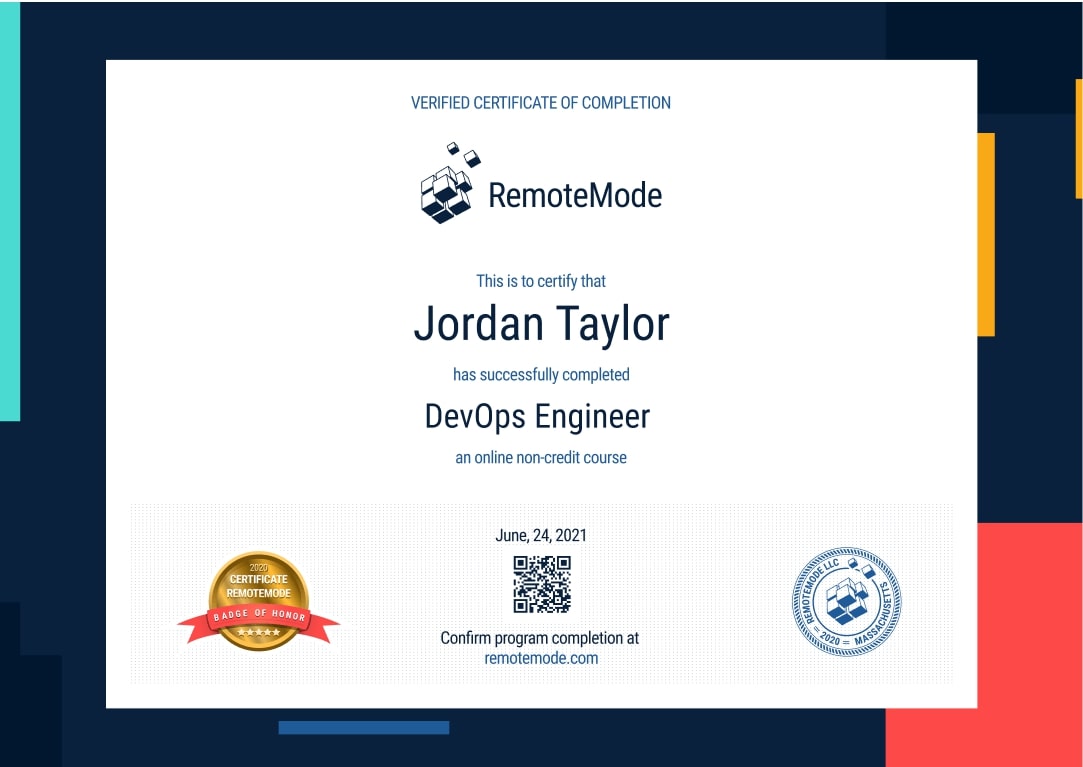Become a DevOps Engineer
Combine traditional IT with its servers, connections, fiber optic, etc., and modern technology like cloud, mobile apps, and iPhones. Launch the software and close the gap between software development and operations. Today DevOps is the newest and up-to-date direction in the IT labor market.
- 4 month
- 123 lessons
- 5 hours per week
- 86 hours



DevOps Engineer Mission Forecast
Landing Zone
With the expansion of the IT sphere, the demand for the DevOps of Engineers is steadily increasing. Lots of new platforms, services and tools are entering the market, and companies are headhunting the specialists who can organize and support these processes. Some biggest and world-known companies like IBM, Microsoft, and Cisco open more than 43,000 positions for DevOps Engineers. The demand is going to show a 24% increase by 2026.
Mission Objective (Who’s Hiring Right Now)
DevOps Engineer Overview
The implementation of the DevOps model for management and software development is expanding and shows stable growth during the last 5 years. Industry leaders all over the world, from NASA to Target, and Hertz to Netflix hire DevOps Engineers to run their systems.
- + 4 Month Courses
- + 5 Hours/Week Self-study
- + 123 On-demand Lessons
- + 86 Hours of training materials
- + Certificate
- + Practise on Topical Real-life Project
- Integrate siloed pieces of software engineering.
- Write script codes to customize and patch software.
- Control the work of software applications.
- Upgrade the security system for end-users of the software.
- Link code, databases, and software to function effectively.
- Keep documents of digital software projects.
Be ready for Liftoff
DevOps Fundamentals
This course was created to walk learners through what a DevOps Engineer is and introduce them to the fundamental tasks and responsibilities of a professional wanting to become one.
About the Course
This course is divided into two segments that will discuss the qualifications a professional should have should he or she want to start studying to become a DevOps Engineer and how one can go about creating Clusters and evaluating performance.
The course aims at arming the professionals taking it with a working knowledge to further the other branches of study that complete the certification as a DevOps Engineer.
Who is This Course For?
This course is meant for professionals who are interested in becoming DevOps Engineers. While anyone can easily harbor such intentions, they would need to possess a set of capabilities, experience, and educational background so as to properly venture into the role.
Course Prerequisites and Skills to be developed
Prerequisites:
- A background in programming
- A working knowledge of Cloud Service Platforms
- Experience in Digital Pipelines Development
- A preliminary background on DevOps Tools and tech know-how
- A grasp of Linux
Skills to be developed:
- Configuration Management
- Continuous Integration
- Code Testing
- Performance Monitoring
- Containerization
DevOps Fundamentals Overview
Part 1 of 2: Get Started
This lesson gets into details of what DevOps Engineering is. The discussion highlights the capabilities, skills, and educational background that a learner aspiring to be a DevOps Engineer should have.
This lesson also details the skills that the learner would be able to develop and acquire through the entirety of the course. Through this, the learner would be made to understand that being a DevOps Engineer's task is a continuous and progressive one given the tools and technologies (with a focus on a grasp of multiple programming languages) that he or she needs to learn how to handle to execute the pertinent DevOps Engineer tasks.
Part 2 of 2: Clustering and Performance
This lesson covers Clustering and Performance. In the context of DevOps Engineering, (and therefore this lesson), Clustering refers to the process of bundling together Master Machines, multiple worker machines, or nodes. The learners would be made to understand that the master machines are the ones coordinating across the nodes.
Apart from this, Pods would also be discussed at length. The discussion stresses that the Pod is the tiniest unit of a cluster and that it is a fundamental part of it as it stands to represent a running process within a cluster.

Mission Control
- Study on course with mentor support
- Take part in Virtual Lab projects to upgrade your portfolio
- See your results in the Dashboard and win the competitions with others students
- Control the progress of study using Activity Tracking Log
- Take a step closer to your job of dream with interview prep and upgrading SV
In partnership with
Set your trajectory (123 video 40 hours)
Certificate of Completion
- Certification recognized by industry companies
- Real project from virtual labs
- The program built on 100% self-study
- Course videos and subtitles
- Practical quizzes
- Mentored by high-class specialists

Grow into a DevOps Engineer
Combine traditional IT with its servers, connections, fiber optic, etc., and modern technology like cloud, mobile apps, and iPhones. Launch the software and close the gap between software development and operations. Today DevOps is the newest and up-to-date direction in the IT labor market.
Learning program
- 4 months duration, 5 hours per week
- 123 lessons, 86 hours
- 100 % flexible timetable
Virtual lab
- Real projects
- GitHub portfolio
- Experts feedback
Career Services
- Interview prep
- SV writing
- Filling LinkedIn profile
Request More Information
View pricing and financing options